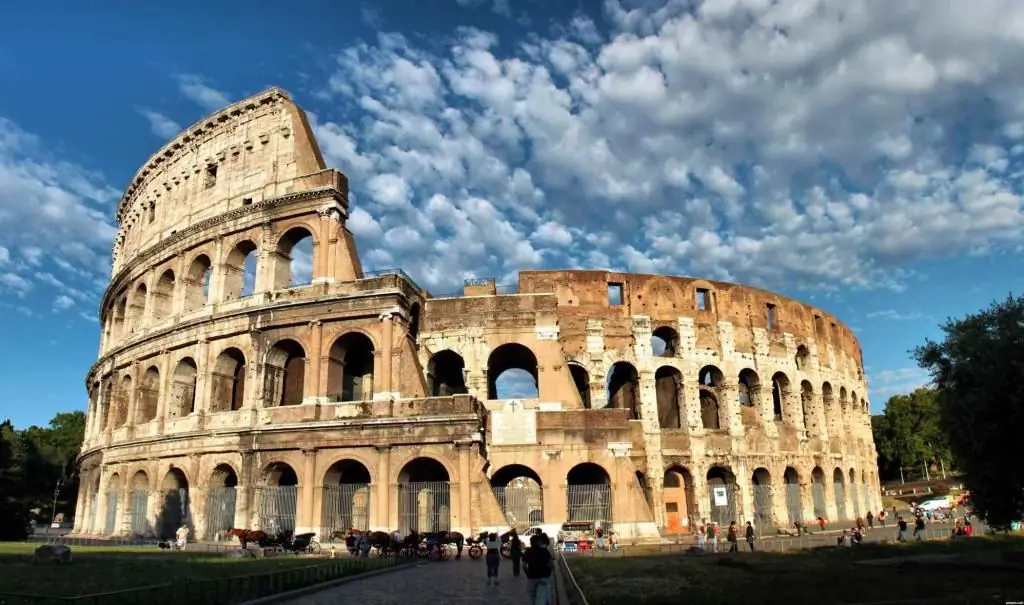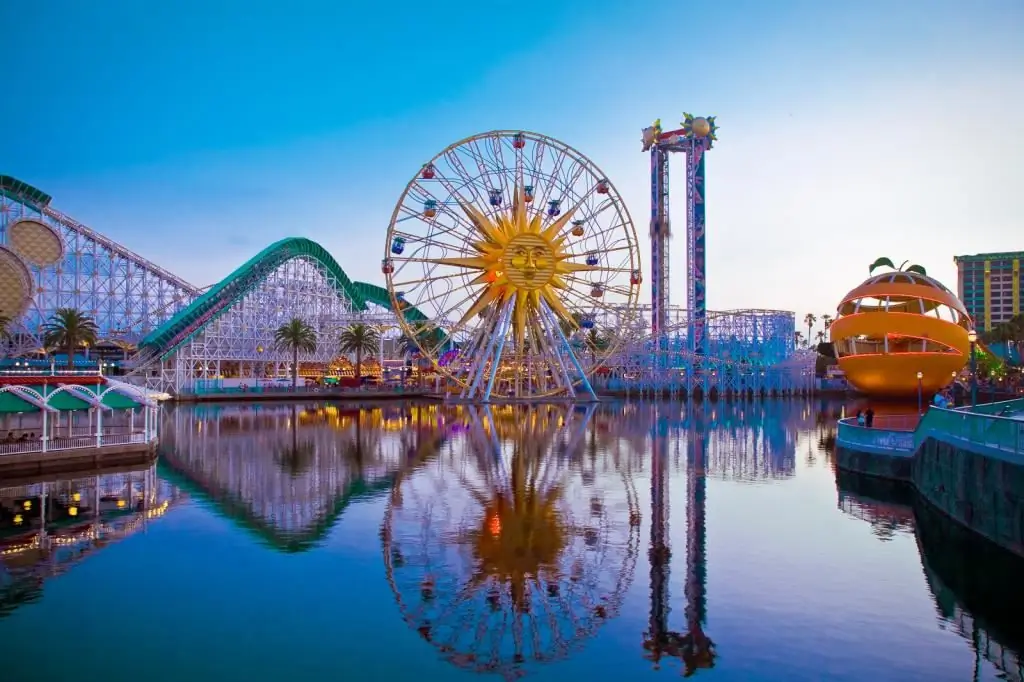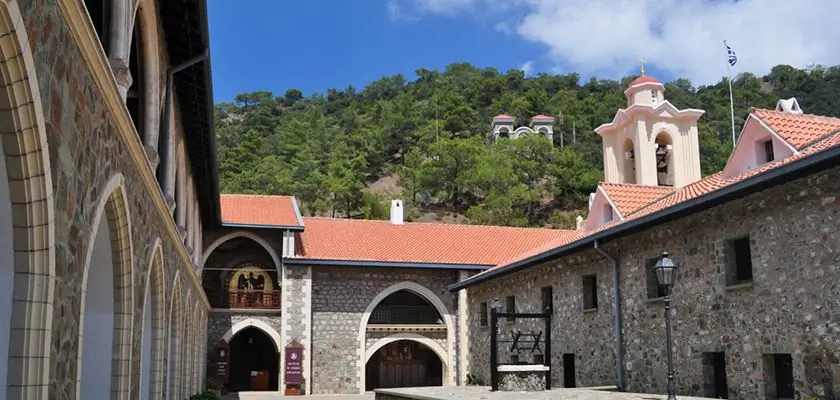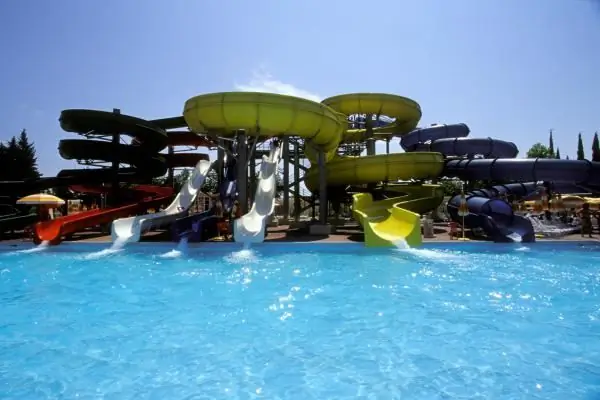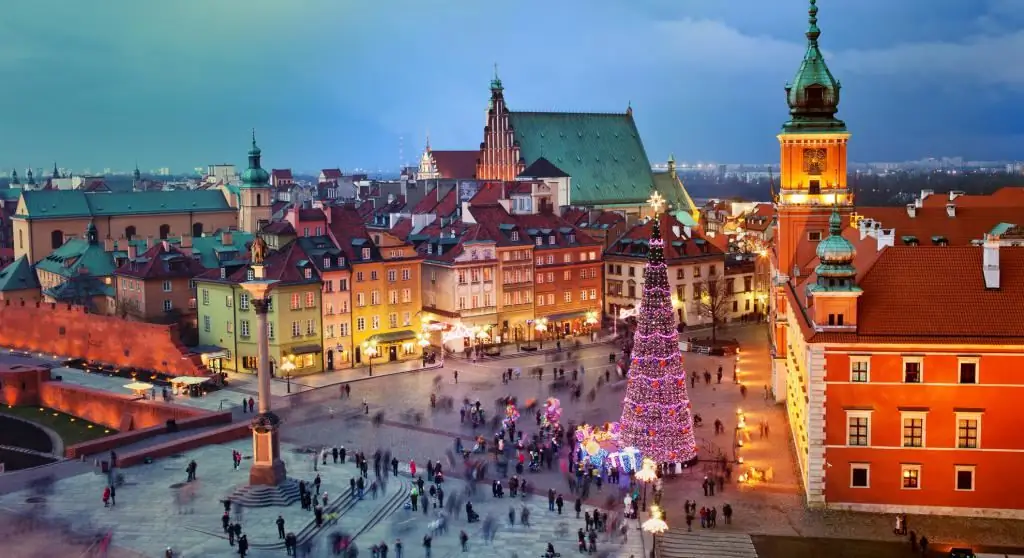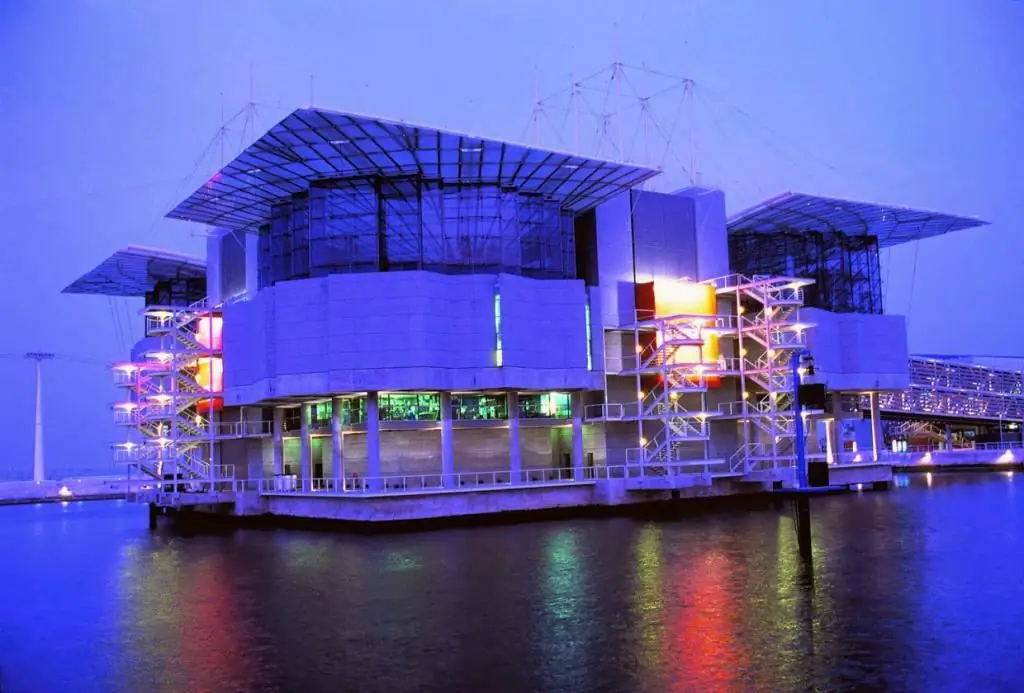- Author Harold Hamphrey [email protected].
- Public 2023-12-17 10:06.
- Last modified 2025-01-24 11:10.
Italy is a European country whose shores are washed by the Mediterranean Sea. It is also a country with a great history, culture, sights. It is about the sights of the country of Italy that will be discussed in this article.
Colosseum
One of the main attractions not only in Italy but all over the world. A great and powerful architectural creation is located in Rome.
The construction of one of the majestic structures of the world lasted about 8 years and was completed in the year 80 AD. e. After the opening of the capital's main amphitheater, performances did not stop there for 100 days: gladiator fights, battles with wild animals, public executions.
The Colosseum struck with its majesty, the perfection of technical structures. Every inhabitant of the Roman Empire considered it his duty to visit Rome and get to the Colosseum, to see the performances.
With the advent of Christianity, executions and gladiator fights were abolished. The construction began to fall into decay, and in the 14th century one of the walls was completely destroyed during an earthquake. After that, the popes anda huge cross was installed in the center of the arena, and in 1750 the Colosseum received the status of a temple. However, in 1803, a major earthquake occurred again and the Colosseum building was mothballed.
Today, only about 30% of the once majestic building remains. Thousands of tourists coming to Italy try to visit the Colosseum. Currently, it is a museum, an unrecognized "Wonder of the World".

Roman Forum
The construction of the first Forum began during the reign of Tarquinius. Initially, part of the territory was intended for trading shops, and the second for public meetings, elections, holidays.
In the 6th century BC, the construction of temples, monuments, monuments began on the territory of the forum. The construction of new roads has also begun.
At the beginning of our era, the Forum became so huge that it became not only the religious and political center of not only the city of Rome, but the entire Roman Empire.
In the middle of the first millennium, the Forum lost its former importance, mainly due to attacks from outside. With the advent of Christianity in the Roman Empire, most of the temples were given over to churches. Life in the Forum again sparkled with new colors. But in the 8th century its meaning was lost, now forever.
In the 19th century, excavations were carried out at the site of the ancient Forum and some buildings were discovered, after which the excavations began to be systematic.
The Roman Forum is another attraction of Italy that is available for viewing these days. She was located very close toColosseum.

Leaning Tower of Pisa
Another famous attraction in Italy. The structure is a "falling" tower and is located in the city of Pisa. It was the tilt that brought the tower worldwide popularity.
Tower - the bell tower is part of the architectural ensemble "Field of Miracles". In addition to the bell tower, it also includes the Cathedral of St. Mary, the cemetery of Santa Campo and the baptistery.
The construction of the bell tower began in the 12th century, in 1172 several pieces of marble were laid in the foundation. Work on the tower lasted more than two centuries and was completed only in 1360.
The slope of the Leaning Tower of Pisa is also not accidental. The fact is that due to an error in the calculations and a small foundation, back in 1178, after the construction of the third floor, the tower began to lean. The annual slope was 1 mm. And no matter how hard the architects tried to stop the "fall", all efforts were in vain. And only restoration work in the 20th century reduced the level of the slope and stopped its growth.

Milan Duomo or Milan Cathedral
The name of the landmark in Italy indicates its location. It is in Milan that the famous Gothic Milan Cathedral is located. Construction of the white marble cathedral began in 1386, but the façade was approved by Napoleon in 1802.
The height of the building is 157 meters and its total area is 11,700 square meters. The building of the cathedral is so graceful and magnificent that it is impossible to describe it in words:numerous spiers, turrets, carvings, the highest spire has a statue of St. Mary.
The Duomo Cathedral is one of the main attractions of Milan and Italy in general.
Interesting facts about the Cathedral:
- there is a nail in front of the altar, there is a legend that this nail was removed from the crucifixion of Christ;
- in the cathedral there is a huge calendar, which is a metal strip with symbols of the zodiac signs printed on it. The sun's rays falling on the strip indicate the constellation that operates during this period of time;
- there are about 3400 statues in the cathedral;
- The rooftop of the Duomo is open to the public with a beautiful view of Milan.
A detailed description of the sights of Italy can be found in the article, but it is better to see this splendor with your own eyes.

Park "Italy in Miniature"
One of the main attractions of Rimini - "Italy in miniature" - was created relatively recently, in 1970, on the initiative of businessman I. Rimbaldi. The park presents about three hundred architectural structures of Italy, made on a scale of 1:50 or 1:20. The park itself looks like the Apennine Peninsula, and the sights there match their real location on the map of Italy.

A visit to the park will be interesting for both adults and children.
Rimini has other famous sights of Italy: Arch of Augustus, Tempio Malatestiano, BridgeTiberius, Castel Sismondo and many, many others.
Arena di Verona
The huge outdoor theater was built in the 1st century AD, which was originally located outside the walls of Verona and only in 256 became part of it. For ten centuries, the grandiose structure remained in its original state. Later, after several earthquakes and looting, it began to fall into disrepair. In the 15th century, the building was restored and theatrical performances began again on its stage.
Arena di Verona in Italy is an attraction that is interesting not only for its architecture and duration of existence, but also for the fact that the amphitheater is still functioning. Opera and ballet performances can be seen on the stage of the historical monument.

Piazza Vecchia and other sights of Bergamo
Located just 50 km from Milan, the city of Bergamo is little known among tourists. Although there are interesting architectural structures in this city of Italy. The sights of Bergamo are varied, but some of them are worth seeing, such as the magnificent Piazza Vecchia, the Church of Santa Maria Maggiore and the Colleone Chapel, the Cathedral of St. Alexander of Bergamo, the walls of Bergamo, the Church of Santa Maria Immacolata delle Grazie.
Beautiful architectural structures, not inferior in beauty to other sights of Italy, in Bergamo will not leave any tourist indifferent.

La Scala
La Scala - namesights of Italy, known all over the world. La Scala is an opera house founded in 1778 in the very center of Milan. The theater got its name from the church of Santa Maria della Scala, which was formerly in its place. During the Second World War, the building was destroyed, but later it was restored and opera performances are held on its stage to this day.
The theater building has excellent acoustics and can accommodate more than two thousand spectators. The opera season starts in December and continues until June. The rest of the time, symphony orchestras are held here and a museum operates, which exhibits exhibits with portraits of opera divas, outstanding events from the life of the theater, busts of composers.

Sistine Chapel
One of the main attractions of Italy, the pride of the Vatican is, of course, the world-famous Sistine Chapel. Externally, the building seems quite simple and almost unremarkable, but the splendor that is inside defies any verbal descriptions.
The Sistine Chapel was built in the 15th century by the architect Baccio Pontelli, but the construction took place under the direction of George de Dolce. From the inside, the chapel is completely painted with the works of outstanding painters, but the loudest name on this list is the name of Michelangelo Buonarroti. The ceiling of the building of more than 1000 square meters is painted by him.

Trevi Fountain
The Trevi Fountain is one of the majestic sights of Rome,crowds of tourists and locals gather near it to see with their own eyes all the majesty and beauty of the structure.
The construction of the fountain lasted almost thirty years, and in 1762 it was opened. However, a whole story precedes its appearance. In the 20s AD. e. during the reign of Octavian Augustus in Rome, a need arose for reorganization and reform. One of the proposals to improve the conditions of the residents was to provide access to clean drinking water. The Aqua Virgo aqueduct was built: water covered a distance of 12 km to quench the thirst of the Roman inhabitants. This was the case until the decision to build the fountain was made.

The fountain was reconstructed in 2014, since the previous restoration was more than a hundred years old, some of the sculptures began to crumble.
Now the fountain is working as before, and any tourist can admire this unique creation of the architect Nicola Salvi.

